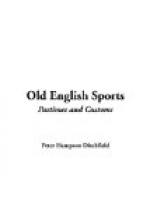“Our king’s a
valiant soldier,
With his blunderbuss
on his shoulder,
Cocks his pistol, draws
his rapier;
Pray give us something
for his sake here.
A stick and a stake,
for our good king’s sake:
If ye won’t give
one, I’ll take two,
The better for me, and
the worse for you.
CHORUS—
“Hollow,
boys, hollow, boys, make the bells ring,
Hollow,
boys, hollow, boys, God save the King.”
Some of the rhymes tell us about the nefarious deeds of wicked Guy Fawkes, who
“... with
his companions did contrive
To blow the House of Parliament
up alive,
With three score barrels of
powder down below,
To prove Old England’s
wicked overthrow;
But by God’s mercy all
of them got catched,
With their dark lantern, and
their lighted match.
Ladies and gentlemen sitting
by the fire,
Please put hands in pockets
and give us our desire:
While you can drink one glass,
we can drink two,
The better for we, and none
the worse for you.”
This rhyme was concluded with the following strange jingle—
“Rumour, rumour, pump
a derry,
Prick his heart and
burn his body,
And send his soul to
Purgatory."[17]
The streets of Oxford used to be the scenes of great encounters between the townsmen and gownsmen (or college students) on this night, who, on any other night in the year, never thought of fighting. Happily in recent years these fights have ceased, but even now the gownsmen are “gated” on the night of the Fifth of November, i.e. are confined to their colleges, lest there should be a renewal of these encounters. So severe were the battles in ancient times, that the tower of Carfax Church was lowered because the townsfolk used to ascend thither and shoot their arrows at the undergraduates; and the butchers were obliged to ply their trade beyond the city walls, because they had used their knives and cleavers in their annual fight.
At Martinmas, or the Feast of St. Martin, it was the custom to lay in a stock of winter provisions, and many cows, oxen, and swine were killed at this time, their flesh being salted and hung up for the winter, when fresh provisions were seldom to be had.
And now the long evenings have set in, and our ancestors in hall or cottage assemble round the blazing hearth, and listen to the minstrel’s lays, and recite their oft-told tales of adventure and romance. Sometimes they indulge in asking each other riddles, and there exists at the present time an old collection of these early efforts of wit and humour which are not of a very high order. The book is called Demands Joyous, and was printed in A.D. 1511. I may extract the following riddles:—“What is it that never was and never will be? Answer: A mouse’s nest in a cat’s ear. Why does a cow lie down? Because it cannot sit. How many straws go to a goose’s nest? Not one, for straws, not having feet, cannot go anywhere.”




